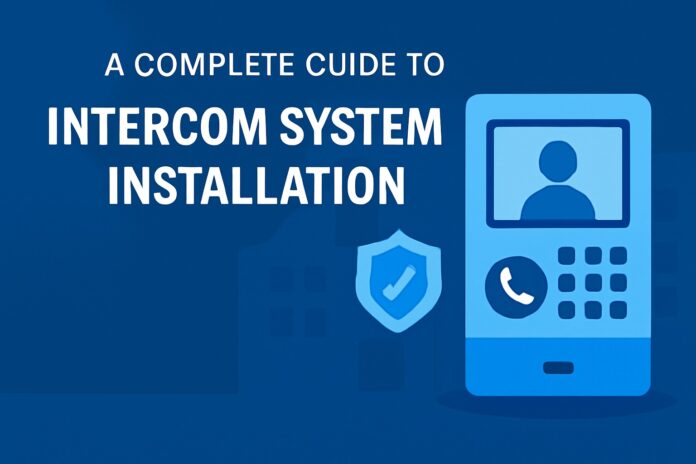In both residential and commercial settings, communication and security are top priorities. One of the most effective ways to enhance both is through an intercom system installation. Whether it is for an office, apartment complex, or private home, intercoms provide a convenient and reliable way to connect people while also improving safety. Installing a system can seem like a big step, but understanding the process, benefits, and considerations will help property owners make the right choice.
What is an Intercom System?
An intercom system is a communication device that allows people in different areas of a building or property to speak with one another. These systems can be simple, like audio-only connections between rooms, or more advanced, offering video, remote access, and integration with other security tools.
The purpose of an intercom goes beyond convenience. It is designed to create a controlled flow of communication, which makes it especially valuable in buildings where safety and access management matter.
Benefits of Installing an Intercom System
Improved Security
One of the primary reasons property owners invest in an intercom system installation is the added security it provides. With an intercom in place, occupants can confirm the identity of a visitor before granting access. This simple step reduces the likelihood of unauthorized entry and creates a safer environment for everyone in the building. Whether used at a home, office, or apartment complex, the ability to screen visitors offers peace of mind.
Convenience
An intercom system also makes daily communication much easier. Instead of walking between rooms, floors, or separate areas of a property, occupants can use the system to connect instantly. This is especially beneficial in large homes, multi-tenant buildings, or busy workplaces where efficiency is a priority. By cutting down on unnecessary movement, the system helps save time and improve overall workflow.
Access Management
In both residential and commercial settings, managing access can be a challenge. Intercom systems streamline this process by making it easier to handle deliveries, service appointments, and visitor check-ins. For instance, staff members in an office or residents in a multi-unit property can communicate with visitors directly and decide whether to grant entry. This feature creates a more organized and controlled environment.
Value Addition
Adding an intercom system can also increase the value of a property. Buyers and tenants are often drawn to modern buildings with up-to-date communication and security technology. By installing an intercom, property owners make their spaces more appealing and competitive in the market. It is a long-term investment that enhances both functionality and marketability.
Types of Intercom Systems
Understanding the available options helps ensure the right fit for your property. The most common types include:
- Wired Intercoms: These systems rely on physical wiring to connect units. They are reliable and have strong audio quality, but require more intensive installation, especially in existing buildings.
- Wireless Intercoms: These operate via radio frequencies or Wi-Fi. They are easier to install because they do not require extensive cabling, making them popular for retrofits or smaller properties.
- Audio-Only Systems: These allow voice communication between parties but do not provide a visual component. They are simpler and usually more affordable.
- Video Intercoms: In addition to audio, these systems include cameras so users can see who they are communicating with. Video features are increasingly common in security-conscious environments.
Common Use Cases for Intercom Systems
Residential Buildings
In single-family homes, intercoms are commonly used for room-to-room communication or to manage access at the front door. Homeowners can confirm who is at their entrance before opening it, which is particularly valuable when children are home alone or when residents want to screen unexpected visitors. In multi-unit residential complexes, intercoms are even more essential. They allow residents to interact with delivery drivers, guests, or service providers without needing to leave their apartments. For property managers, this functionality reduces the risk of unauthorized visitors gaining entry and helps ensure resident safety.
Office Environments
Intercoms are equally valuable in office settings. Businesses often use them to streamline communication between departments or floors, saving employees the time and effort of traveling across the building. For companies with high visitor traffic, intercom systems provide a secure way to manage check-ins and ensure that only authorized guests can enter restricted areas. This is particularly helpful in industries where protecting sensitive information or equipment is a priority.
Educational Institutions
Schools, colleges, and universities rely on intercoms for both communication and safety. Classroom-to-office systems allow teachers to contact administrators quickly. In contrast, campus-wide intercoms can broadcast announcements or emergency alerts in real time. In situations where rapid communication is necessary, such as lockdowns or weather-related closures, the intercom becomes a critical tool for keeping students and staff safe.
Healthcare Facilities
Hospitals and clinics also benefit from intercom system installation. These facilities require constant communication between different departments, from nursing stations to patient rooms. Intercoms help staff relay messages quickly, reducing delays in care. In addition, secure entry points supported by intercom systems allow medical staff to control access to restricted areas like laboratories, pharmacies, or surgical wings.
Industrial and Commercial Spaces
In warehouses, factories, and other industrial environments, intercoms enhance both efficiency and safety. Workers can communicate across large or noisy spaces without leaving their stations, which keeps production flowing smoothly. Intercom systems can also be tied to entry points to regulate access for vendors, contractors, or truck drivers making deliveries. This reduces confusion at loading docks and helps prevent unauthorized entry into sensitive areas.
Final Thoughts
An intercom system installation is more than a convenience. It is an investment in security, communication, and overall property value. By carefully planning the installation, selecting the right type of system, and relying on professional expertise, property owners can create a safer and more efficient environment. Whether for a busy office, a residential complex, or a private home, an intercom system delivers long-term benefits that make daily life easier and safer.


